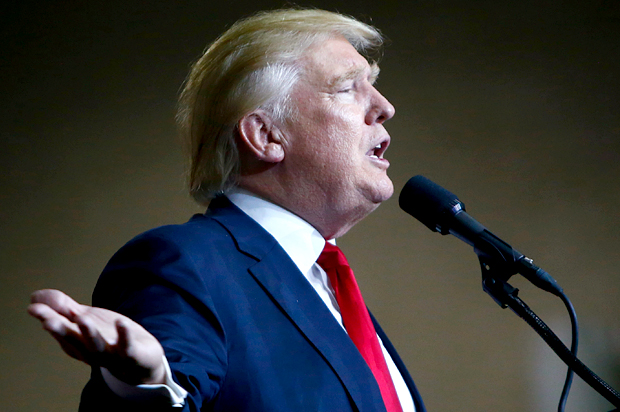This piece originally appeared on BillMoyers.com.
It has not gone without notice that Donald Trump’s Republican National Convention acceptance speech was a paean to law and order, a phrase he used four times.
But what about the words he barely used at all?
If we were to compile a lexicon for standard political speeches in America, going back, say, a century and a half, surely we would find certain words and phrases at the top of the frequency list: free (with variants freedom and freed); liberty; democracy.
In particular, freedom, as historian Eric Foner, among others, has pointed out, is so flexible a word as to have permitted candidates including Abraham Lincoln, Theodore and Franklin Roosevelt, Wendell Willkie, John Kennedy, Barry Goldwater and Ronald Reagan to have soaked their speeches in it. The American faith in freedom runs from First Amendment freedoms to free land, free soil and free enterprise. Accordingly, American political speeches include so many mentions of free and freedom that the terms are virtual punctuation marks.
Not Donald Trump. He used the words freedom once and free twice. His single use of “freedom” was a reference to free trade, but of an odd sort: he pledged “to never sign any trade agreement that hurts our workers, or that diminishes our freedom and independence.” That is, he used it to refer to the freedom of the nation in relation to other nations, not the freedom of citizens. He also used it in a way diametrically opposed to traditional Republican (and Democratic) defenses of free trade.
As for “free,” he used it (in a nontrivial way) twice. One of those mentions was a defense of free speech, and the other was this: “Nearly 180,000 illegal immigrants with criminal records, ordered deported from our country, are tonight roaming free to threaten peaceful citizens.” Read: the freedom of “roaming” Latinos is perilous.
Because he used free once as a positive and once as a negative, I’m going to let those uses cancel each other out and credit him with zero to one “free” — depending on how you want to count his free trade reference.
He did not once use the word democracy or democratic or their variants. (In all my mentions of democratic, I do not count references to the Democratic Party, or, as Republicans prefer to call it, the Democrat Party).
As for justice, aside from mentions of Supreme Court judges, he used it only once: to refer to what Hillary Clinton deserves for her “terrible, terrible crimes.” You can decide whether to credit him with one or zero for this.
As for equality, inequality and so on, he used them a total of twice.
Here are my counts for acceptance speeches running back to 2000.
| free, freedom | democracy, democratic | just, unjust, etc. (not syn for judge or only) | equal, unequal, etc. | ||
| 2016 | Trump | 0-1 | 0 | 0-1 | 2 |
| 2012 | Romney | 14 | 1 | 0 | 0 |
| 2008 | McCain | 4 | 2 | 3 | 2 |
| 2004 | George W. Bush | 35 | 7 | 2 | 0 |
| 2000 | George W. Bush | 1 | 0 | 2 | 4 |
| free, freedom | democracy, democratic | just, unjust, etc. (not syn for judge or only) | equal, unequal, etc. | ||
| 2016 | Clinton | 1 | 1 | 3 | 2 |
| 2012 | Obama | 4 | 2 | 0 | 0 |
| 2008 | Obama | 35 | 7 | 0 | 2 |
| 2004 | Kerry | 1 | 0 | 0 | 2 |
| 2000 | Gore | 5 | 3 | 2 | 5 |
Needless to say, I am not assessing these candidates for their actual contributions to freedom, democracy, justice or equality. George Bush’s fervent embrace of freedom was, I believe, nearly entirely propagandistic, meant to justify the mad invasion of Iraq and the catastrophes that followed. Nor am I proposing an explanation of some of the other anomalies in this table, let alone offering a general theory of political rhetoric.
I am simply pointing out that Donald Trump, aside from being a serial liar, a racist, a sexist, a nativist, an ignoramus, a bully, a braggart, a pal of tyrants and mobsters, a contemptuous and contemptible insult artist and all-around dead soul, also has cut himself loose from the traditions that have long served — in sickness and in health — to shelter, cover or justify the political declarations of recent political leaders across the board. Were there time enough to extend this table back over the decades, I think it would likely confirm this pattern.
To speak of Trump’s “values” is laughable. What he values is wealth and power — chiefly his own. It is quite precise to say he is un-American, unless you believe all America stands for is gold plate, bravado, riding roughshod over losers and sucking up to winners. He hasn’t the foggiest idea of what American citizenship is for. He may have a birth certificate, but in the spiritual sense, the intellectual sense that was the hallmark of this republic, he is not an American. He is something else.

